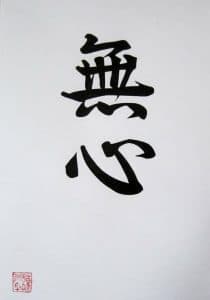Martial Arts Philosophy
The legendary founder of Kung Fu is also the man credited with the invent of Zen (Ch’an) Buddhism. Bodhidharma was said to have traveled to China from India and began teaching the monks at Shaolin temple in the 5th century. His brand of Mahayana Buddhism was influenced by Confucianism and Taoism and became the sect we call Zen today.
Zen is just one of many distinct philosophies that influence martial arts and its practitioners today, but it was among the earliest and most impactful force on the internal aspect of practice.
Non-Attachment
A basic tenant of eastern philosophies is non-attachment. Since everything in life is in a constant state of change, to be attached to anything is to be tossed about like a feather in the wind. This is not to say we shouldn’t have goals or be committed to something, but that if we are attached to our efforts turning out in a certain way, we can only be thrown off balance.
In practice, we see this principle at work constantly. While throwing basic kung fu techniques and combinations (kihon), if we make a mistake on one count, it is human nature to dwell on it. We beat ourselves up and say, “What’s wrong with me?” Meanwhile, the next few counts have come and gone and we’ve messed those up as well. When rolling in Brazilian Jiu-Jitsu, we often find ourselves being attached to a certain technique. This closes the door on all our other options, and makes us ineffective at flowing to the next technique when our partner defends.
What we seek to do instead is be in a flow state where we can freely move from one technique to the next, one moment to the next, without being stuck. This state is commonly called Mushin.
Mushin
Mushin, or no-mind, is the state of mind we constantly work towards cultivating in marital arts. It’s also the aim of Zen. If someone asks me, “what is Zen?” I smile. If it’s a student who has been around for a while, I might give them a good smack to help them experience Zen. This is the nicer version of the answer employed by many Zen teachers. My answer to new students is that Zen is any practice that puts you in Mushin.
We don’t seek mindlessness, but rather a complete, single focus on the present. When we completely live in our body and let all distractions fall away, we experience a different state. I remember the first time I meditated, for a moment I was able to simply focus on my breath. This was my first glimpse of Mushin. I thought to myself, “Wow, I’m doing it! This is great! I’m so focused and relaxed.” And as soon as I started congratulating myself, it was gone.
Mushin is a place beyond the ego, truly beyond all thought. It is an expansive state of consciousness where the separation between us and the universe disappears. This is usually a satori, or momentary


Leave A Comment